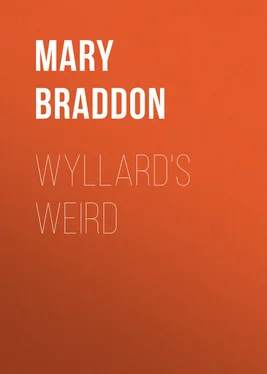Mary Braddon - Wyllard's Weird
Здесь есть возможность читать онлайн «Mary Braddon - Wyllard's Weird» — ознакомительный отрывок электронной книги совершенно бесплатно, а после прочтения отрывка купить полную версию. В некоторых случаях можно слушать аудио, скачать через торрент в формате fb2 и присутствует краткое содержание. Издательство: Иностранный паблик, Жанр: foreign_antique, foreign_prose, на английском языке. Описание произведения, (предисловие) а так же отзывы посетителей доступны на портале библиотеки ЛибКат.
- Название:Wyllard's Weird
- Автор:
- Издательство:Иностранный паблик
- Жанр:
- Год:неизвестен
- ISBN:нет данных
- Рейтинг книги:3 / 5. Голосов: 1
-
Избранное:Добавить в избранное
- Отзывы:
-
Ваша оценка:
- 60
- 1
- 2
- 3
- 4
- 5
Wyllard's Weird: краткое содержание, описание и аннотация
Предлагаем к чтению аннотацию, описание, краткое содержание или предисловие (зависит от того, что написал сам автор книги «Wyllard's Weird»). Если вы не нашли необходимую информацию о книге — напишите в комментариях, мы постараемся отыскать её.
Wyllard's Weird — читать онлайн ознакомительный отрывок
Ниже представлен текст книги, разбитый по страницам. Система сохранения места последней прочитанной страницы, позволяет с удобством читать онлайн бесплатно книгу «Wyllard's Weird», без необходимости каждый раз заново искать на чём Вы остановились. Поставьте закладку, и сможете в любой момент перейти на страницу, на которой закончили чтение.
Интервал:
Закладка:
Mr. Heathcote left his portmanteau at one of the hotels in the market-place, and drove at once to the convent. It was a large white building, with plastered walls, far from beautiful in itself, and showing every sign of poverty; but the gardens were neatly kept, the rooms were exquisitely clean, and the clumsy old Breton furniture was polished to the highest degree.
Mr. Heathcote was received in the convent parlour by the Reverend Mother, a homely little tub-shaped personage, in a black serge habit and a picturesque white cap, which concealed every vestige of hair upon her broad intelligent forehead. She had kindly black eyes, and a frank benevolent smile, and Heathcote felt at once at his ease with her. She looked a little disappointed when, in answer to her preliminary question, he told her that he had not come to offer a new pupil. The pupils were the chief source of revenue for the convent, albeit the pension was of the smallest.
"Have you ever seen that locket before, madame?" he asked, laying the silver medallion before the Reverend Mother.
"I have seen many such," she answered. "The Holy Father allows us to dispose of them for the benefit of the convent."
"There is a little paper inside with some writing. Will you look at it, please?"
She opened the locket and unfolded the paper.
"Yes, this is Sister Gudule's writing. I know it very well indeed," said the nun, looking at her visitor with a puzzled air, as if wondering whether the gentleman had not gone a little astray, his real destination being the great monastic madhouse yonder on the crest of a wooded hill.
"Sister Gudule is still living – still with you, perhaps?"
"Yes?" interrogatively.
"And you remember Léonie, to whom that little picture was given?"
The Reverend Mother smiled her modest smile.
"Léonie is not an uncommon name," she replied. "We have had many pupils so called from time to time. Our school numbers over a hundred and fifty pupils, you must remember."
"Do you recall any pupil of that name who left you two years ago?" asked Heathcote.
"We have from thirty to forty pupils leaving us every year. Will you permit me to ask the object of your inquiry?"
"It is a very serious one, or I should be desolated to give you so much trouble," answered Heathcote courteously, in that polite language which he spoke almost as fluently as his native English. "The poor girl to whom that locket belonged met her death in my neighbourhood less than two months ago. She fell from a railway-carriage as the train was crossing a viaduct. Whether that death was accidental or the result of a crime remains as yet unknown. But there are those in my country to whom it is vital that the whole truth should be known. If you can help me to discover the truth, you will be helping the cause of justice."
"Sister Gudule will remember," said the Reverend Mother, ringing a hell. "She is one of our lay-sisters, a great favourite with all the children. She nurses them when they are ill, and takes care of them when they go out for a holiday, and plays with them as if she were a child herself."
A lay-sister, the portress, answered the bell, and went in quest of Sister Gudule.
"She has a very unprepossessing appearance," said the Reverend Mother. "I fear you may be a little shocked at first seeing her, but she is so amiable that we all adore her. She has been the victim of misfortune from her cradle. Her deformity is the consequence of a nurse's carelessness. It turned the heart of her mother against her, and she was a neglected and unloved child. Her family was noble, but the husband speculated in railways, and the wife was silly and extravagant. By the time Gudule was a young woman poverty had overtaken her father, and he was only too glad to acquiesce in the girl's resolution to enter a convent. She came to us penniless thirty years ago, and has worked for her bread ever since. I do not think I exaggerate when I say that she is the most valuable member of our community."
The door was opened softly and Sister Gudule appeared. This little preface from the Reverend Mother had not been unnecessary to lessen the shock of her personal appearance, which was startling in its unqualified ugliness.
Sister Gudule de la Miséricorde was the very type of the wicked fairy in the dear old child stories. She was short and squat, with broad shoulders and a decided hump. She had a nose like a potato, and a lower lip like that of the lady who moistened the spinster's yarn; she had an undeniable moustache and beard; yet in spite of all, there was something pleasant, conciliating, reassuring in her face. The low broad forehead suggested intellectual power; there was a humorous twinkle in the small gray eyes, as of one who could revel in a joke; the thick under-lip and prominent under-jaw were the indications of a boundless benevolence.
The Reverend Mother handed the locket and its enclosure to Sister Gudule.
"I must tell you that the Sister has a most miraculous memory," she said confidentially to Heathcote. "I have never known her forget the most trivial event in the history of our lives. She is our unwritten calendar."
"It is Léonie Lemarque's locket," said Sister Gudule. "How comes it here? Is my little Léonie in Dinan?"
"Léonie Lemarque!"
How glibly she pronounced the name; and how strange it seemed to Edward Heathcote to hear it! Like a name out of a tomb.
"The owner of that locket is dead," he answered gently.
"Dead! Léonie Lemarque! Dead at twenty years old! Dead! Why, there was not a healthier child in the convent, after we had once built up her constitution. She was in a sad way when she came to us."
"Léonie Lemarque!" repeated the Reverend Mother. "I never thought of her when Monsieur showed me the locket. Léonie Lemarque! Yes, she left us in 1879 to go to her old grandmother in Paris. And now she has met with a violent death in England. Monsieur will tell you."
Monsieur repeated his story, this time with further details, for Sister Gudule questioned him closely. She would have every particular. The tears streamed down her cheeks, hung upon her bristly moustache. She was deeply distressed.
"You don't know how I loved that child," she said, excusing herself to the Superior; and then to Heathcote, "Ah, Monsieur, you could never understand how I loved her. I saved her life. From the weakest frailest creature, I made her a sound and healthy child. Indeed, I may say that I did much more than this. With the help of God and the intercession of His Saints I saved her mind."
"It is quite true," said the Reverend Mother. "The child came to us under most peculiar circumstances. Sister Gudule took entire charge of her for the first year."
"And she rewarded me tenfold for my trouble," added Gudule; "she gave me love for love, measure for measure."
"Will you tell me all about her – every detail? The knowledge may help me to avenge her death," said Heathcote eagerly. "It is my belief, and the belief of others, that she was foully murdered."
He was intensely agitated. He felt as if he had taken into his hand the lever which worked some formidable machine – an instrument of death and doom, and that every movement of his hand might bring destruction. Yet the process once begun must go on. He was no longer an individual, working of his own free will; he was only an agent in the hands of Fate.
Конец ознакомительного фрагмента.
Текст предоставлен ООО «ЛитРес».
Прочитайте эту книгу целиком, купив полную легальную версию на ЛитРес.
Безопасно оплатить книгу можно банковской картой Visa, MasterCard, Maestro, со счета мобильного телефона, с платежного терминала, в салоне МТС или Связной, через PayPal, WebMoney, Яндекс.Деньги, QIWI Кошелек, бонусными картами или другим удобным Вам способом.
Интервал:
Закладка:
Похожие книги на «Wyllard's Weird»
Представляем Вашему вниманию похожие книги на «Wyllard's Weird» списком для выбора. Мы отобрали схожую по названию и смыслу литературу в надежде предоставить читателям больше вариантов отыскать новые, интересные, ещё непрочитанные произведения.
Обсуждение, отзывы о книге «Wyllard's Weird» и просто собственные мнения читателей. Оставьте ваши комментарии, напишите, что Вы думаете о произведении, его смысле или главных героях. Укажите что конкретно понравилось, а что нет, и почему Вы так считаете.












